Features
Bassist Rob Calder’s Humble Approach to Playing, Recording and Enjoying the Journey
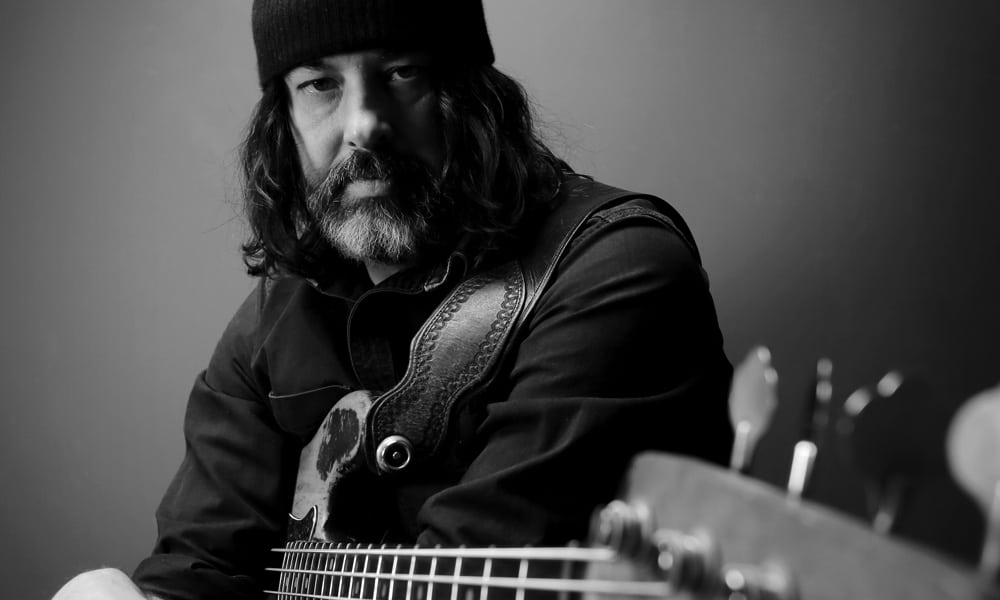
Bassist Rob Calder is the ultimate freelance session player.
His resume includes playing live and recording studio albums with Passenger/Ed Sheeran, Matt Nathanson, Dope Lemon—even Kanye West. He has toured across the globe and spent much of his post-college life, where his love for bass was solidified, playing to huge crowds with Passenger and acts like Angus & Julia Stone and Irish singer/songwriter Declan O’Rourke. I spoke with Rob Calder about humble beginnings, finding joy in the craft of playing bass and the continued journey towards simplicity…

I happened upon you while talking with the guys from the alternative rock band After Planet. They were saying “you have to interview Rob!” So I had to go look up your website and when I realized who else you were playing with, it occurred to me how prominent your playing has been with Passenger as well as other singer/songwriters. My kids were singing “Let Her Go” (from Passenger) on the radio constantly–and here you were playing on it!
So how did you get started?
…How did I get started? I basically picked it up the instrument like at the start of my college career.
I was like every other kid. My story’s not unique at all. I started with piano and I didn’t really like it. And I was in orchestra for a time and I was so uninspired. I hardly practiced and then eventually I gave it up. And then as a goof, I picked up the bass just right before my freshman year started at Indiana University and I loved it immediately. It was, I mean, basically one of the very few moments where I had an epiphany… Oh, I’m going to do this for a long time.
Kind of a late start.
Yeah, a late bloomer, I think. I still feel that way. I don’t know.
So as a goof? That’s funny. Usually people have a hard time explaining this, because a lot of people will ask this question “Why did you pick the bass guitar?” There’s a lot of people who automatically think that guitar is this complex instrument and bass is so easy. And I think that people who are not musician types don’t quite understand how important bass is.
Yeah, people get attached to it quickly. I immediately was. I can say I was a bass player first. I wasn’t one of those people who started out on guitar and then switched because nobody else wanted to play bass. I actually loved it. But the thing is you are right, the bass is easy to play. I feel like it is… I don’t want to mystify it too much.
I think there are a lot of tasteful things you can do, and I hear that in your phrasing and the way you fill in space within the songs, much like Paul McCartney. I know that for me, I didn’t appreciate McCartney as a kid starting out on bass. I couldn’t appreciate him until I got older.
Same, I actually didn’t love Paul McCartney until later and then I became like, obsessed (laughter), I’m sure it’s obvious in my playing.
A lot of people wear their influences on their sleeve. Do you have anybody else who influenced you besides McCartney when you started out?
I tried to learn every lick that Geddy Lee ever played. I tried… and you know, I probably failed (laughs). I think I listen back to it now and I don’t quite hear it as much, but at the time it was pretty new to me and I loved a lot of that prog stuff, like Chris Squire and Tony Levin and anybody that was playing any song in 5/8 or 7/8 time. I was drawn to them initially because I thought that was cool. It is cool.
It’s ok to admit that today.
It’s back! (laughs)
How did you develop your style, sort of on the fly or did you actually start leaning towards something you liked? I noticed some of the live performances you were playing using all your fingers, thumb included on your picking hand. Do use a pick as well when it’s called for?
Yeah I use it as well. I do love playing with a pick too, as it brings out a completely different tone and approach. You know it’s like a different instrument with a pick, and I think that’s really good because otherwise I’ll get completely bored always doing the same thing. One of the great things about being a freelance bass player is you get to try something new every day with a new band. I know the fingers vs. pick debate, but I think that the way that you hit the string with your right hand whether it’s with a pick or with the side of your finger—any kind of different way that you touch those strings is going to have a huge impact on your tone. In fact, I think the entirety of tone comes from that point of impact. I think the more approaches you apply, there’s your pedal board.
And I love effects, but when you talk about style… I just… I don’t know if it’s a style, but it’s a concept that I really decided to focus on.
Seems to be working, you definitely attract a lot of artists just based on just your style of playing.
What do you like in the way of effects, when you do use them?
My favorite effect is an overdriven amp in the studio—that’s my favorite effect, and I know it’s not a pedal board. Underrated. I do like distortion pedals and I’ve got an Electro Harmonix… not sure which make, I’m really bad with models (laughs).
I think you’re right. Very overrated compared with the ability to actually use a solid bass with good pickups and a decent amp.
Yeah, I think that’s the magic. I do think that’s the magic, but I do have a pedal board and occasionally I’ll plug it in. I’m not averse to it, but I’m usually—bass, cable, amp— let’s do this!
You have recorded with a bunch of different producers including Rick Rubin and Mitchell Froom, how adaptable were they to you in the recording process—were they hands-on or did they let you do your thing?
Their recording style, in my opinion, is once you get into the studio with those guys—pretty much all of them—they don’t tell you much. They’re happy that you’re doing what you’re doing; I think getting into the studio once you’re sort of like… trusted. The thought is: “Okay this guy can do what he’s doing”. Mitchell Froom was somebody who was notorious for being sort of hard on musicians that are related or brought in by the artists themselves. He had stories that terrified me (laughs). But the interesting thing is the moment you sat down and you’re sitting there playing with (session drummer) Matt Chamberlain… he totally didn’t tell me anything. He was like, “Yeah, that’s good”. It’s like there was no direction—I didn’t feel like he was micromanaging me at all.
And that was an incredible experience. And for those producers, nobody looks at the bass player anyway— let’s be honest with how it is. (laughter)
Passenger has kept you very busy!
Yeah, we just got done with 2 years of touring and we keep recording records. I’ve done 4 records with him and then the touring. With his current tour, which is winding up, he went back to just him and his acoustic guitar. Then we will be convening again at some point at the end of this year, and he is really prolific—he writes so much music.
It’s interesting how you started out your freshman year at Indiana University and then… to be in front of those crowds. You must be thinking, “I couldn’t have predicted this!”
I certainly didn’t, but I’m definitely happy for the development. It’s been really interesting that with all of these artists I somehow managed to fall into… like connecting with… all these international artists… like the brother/sister Angus & Julia that are Australian, and then also Declan O’Rourke who’s Irish and Mike who’s Passenger and he’s English. It’s been very strange and I often have found that this is mystified much more than any career. How did I end up on this continent over here?
It’s wild. I’m really blessed.
I guess it’d just be something that’s normalized for you and you say “This is great, I get to do this!” whether it’s 500 people 50,000 people.
Yeah it doesn’t matter, at some point the size thing (is there), but much more importantly is the feeling of being blessed, you know? I appreciate it every day…the opportunity to do this for a living, because it does not come to everybody. And there are so many good players out there… great, amazing bass players.
Your bass I mainly see you play with is a P-bass that looks like you added a single coil to it or was it originally designed like that?
Exactly, it’s a P-bass that had a single coil attached to it. It’s a 1968 Precision, so that that would be worth quite a bit more if it didn’t have that pickup in it. So honestly that’s how I could afford it. (laughs)
And do you have other basses in rotation?
I have some backups but (the 68’) is what I use primarily. Yeah, if I have a choice I’m using this one, it’s my main instrument. I can get the most out of it and it’s really sturdy. But I also have a 64’ Hofner Club bass that I use a ton for recording and I’ve got a Harmony from the 60’s. That’s a real interesting one… I sometimes use an NS design upright. Those are kind of a little bit obscure I guess. It bolts on to like a fancy, retrofitted drum-hardware stand. It’s really interesting design and I’ll use that for recordings. If I’m lucky to do a full record with an artist where towards the end whoever’s in charge says, “Let’s make this (track) sound a little different,” that’s when I say, “Hang on, this is a weird one” and everybody’s like, “What the fuck is that?” (laughter)
How did you get hooked up with the guys from After Planet out there in California? Sort of a different style of music compared to what you mostly play.
I love bands like Sunny Day Real Estate and Sugar. Earlier bands I’m way into. That’s the kind of music they do. And they wanted me to play with them. I am super enthusiastic about their style. I think their music is amazing. Yeah, so they’re out in California and LA and I’m based out there.
And you recorded with them on their new EP Prévisionniste?
Yes, depending on what you heard. I began recording with them and we’re slowly working through the tunes. So yeah.
For me, they definitely have a Failure-type vibe, and I always love those guys. After Planet is an extension of Failure’s classic Fantastic Planet for me. I definitely have heard your work in the songs. And I hear overdriven amp or effects—some gnarly stuff, whatever it is!
Depending on what it is, I mean, there could be some plugins going on. But yeah, to me it’s always the amp. If I can drive the amp, that’ll be the coolest.
As for amplification, what do you typically use?
I love the Ampeg B-12, not the usual 15, and I drive the shit out of it and just make it go as hard as it can. And that’s what sounds amazing.
More pronounced?
Yeah, but you have to put it in a padded room because it’s just gonna wail… nothing that you can do in the basement of your mom’s house! (laughs)
That’s when we have to remind the bass player that nobody needs to hear the bass player! (laughter)
Your band Schmetterling was probably the coolest of all the stuff I listened to on your webpage robcalder.com… It seems very indulgent. What started that and what’s the direction you’re taking?
Awesome. I’m glad that you’re into it.
It is totally indulgent. It started off with me just trying to familiarize myself with logic and I had been collecting these basslines and I dropped them in and just started creating these super-whack beats,. After that I tapped in some keyboard parts and next thing you know, I was making these “answer to no one” songs that weren’t destined for any like singer/songwriter anything, which I do so much… this will just be for me.
Then I started jamming with my friends, Steve Elliot (guitar player) and Brian Griffin (drums) and they were like, “What are we gonna play? We actually could do some gigs.” And very sheepishly, I got some of these demos and they’re really kind of crazy. I wasn’t gonna show them to anybody, but those guys interpreted my whack beats and my weird melodies and they made it super cool—made me realize this actually could be something. So as we speak it’s being mastered right now as a record for release!
Looking forward to it. It’s super cool. I love to put stuff in a category but I have no idea how to categorize it!
Awesome, I’m tickled you like it. I’m really stoked about it!
Check out Rob’s hefty volume of work @ robcalder.com/ including his hard to define, but exceptional band Schmetterling. And look for him playing live, coming soon to a continent near you!
Also, check out Rob driving his Ampeg B-12 hard with After Planet: IG @afterplanet on their upcoming EP Prévisionniste.
Features
Alberto Rigoni On Unexpected Lullabies
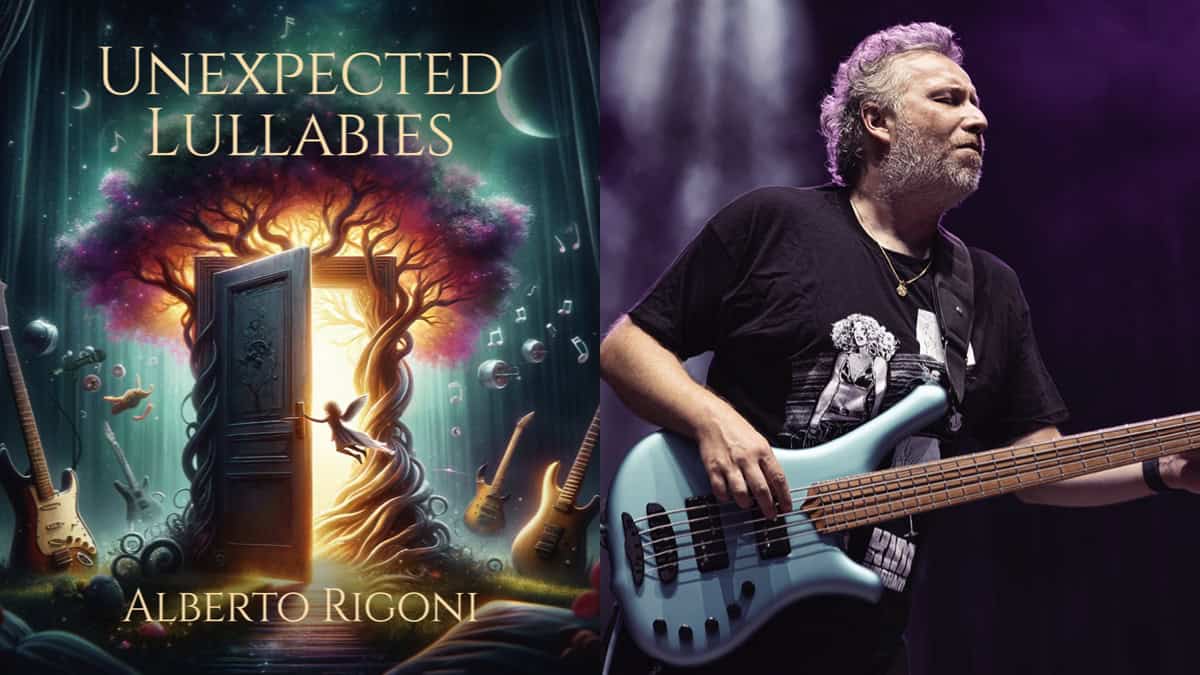
Readers have been fans of the composer, bass player, and Bass Musician contributor Alberto Rigoni for some time now.
In this interview, we had the opportunity to hear directly from Alberto about his love of music and a project near and dear to his heart, “Unexpected Lullabies”…
Could you tell our readers what makes your band different from other artists?
In 2005, I felt the urge to write original music. My first track was “Trying to Forget,” an instrumental piece with multiple bass layers (rhythm, solo, and arrangement), similar to the Twin Peaks soundtrack. When I played it for a few people, they really liked it, and I decided to continue composing based on my instinct and ear without adhering to any specific genre. In 2007, I released “Something Different” with Lion Music. The title says it all! Since then, I’ve released many solo albums, each different from the others, ranging from ambient to prog, fusion, jazz, and new age. I am very eclectic!
How did you get involved in this crazy world of music?
As a child, I listened to the music my parents enjoyed: my dad loved classical music, while my mom was into Pink Floyd, Genesis, Duran Duran, etc. These influences left a significant mark on my life. However, the turning point came at 15 when a drummer friend played me “A Change of Seasons” by Dream Theater, which was a shock! From that moment, I decided to play bass and cover Dream Theater songs, which I did for many years with my cover band, Ascra, until it disbanded in 2004. After that, I joined TwinSpirits (prog rock) led by multi-instrumentalist Daniele Liverani. Since then, I haven’t played any more covers!
Who are your musical inspirations, and what inspired the album and the songs?
My roots are in progressive rock metal, with influences from bands like Dream Theater, Symphony X, and many others. However, I listen to all genres and try to keep an open mind, which helps me compose original music. On bass, I was significantly inspired by Michael Manring and Randy Coven (bassist of Ark, Steve Vai, etc.). But I don’t have a real idol; I just follow my own path without compromise.
What are your interests outside of music?
Living in Italy, I love good food and wine! Beyond that, I have a deep interest in art in general and history, not just of my country. I enjoy spending time with friends, skiing, biking, and walking in nature. This is how I spend my free time. The rest of my time is devoted to music and my family!
Tell us about the new album.
It is definitely an out-of-the-box album. When I found out last year that I was going to have a baby girl, I decided to compose a sort of lullaby album, but I didn’t want to cover already famous lullabies. So, I started composing new tunes with the goal of creating an album that was half-sweet and half-hard rock. I did include some covers like “Strangers in the Night” by Frank Sinatra, sung by Goran Edman, former lead singer of Malmsteen. It’s not exactly a lullaby, but I felt the lyrics fit the album, as does the instrumental version of “Fly Me to The Moon.” There are also tracks with just bass and piano (Nenia) or two basses (Vicky). It was definitely an interesting creative process!
What is the difference between the new album and your previous releases, and will there be any new material from your other outfit called BAD AS?
BAD AS is essentially a metal band with several influences including prog. My solo genre is quite different, although there are some metal songs on a few albums. It’s always difficult for me to categorize my music… let’s say it’s a mix of prog, ambient, fusion, and new age.
Where was the album recorded, who produced it, and how long did the process take?
I produced my last album entirely by myself, including mixing and mastering. Unlike other albums I’ve produced within a few months, this one took much longer, perhaps because I was very busy or maybe because I wanted it to be perfect for my daughter, who is now three months old. In any case, I am satisfied. Once again, I did something different from my previous albums.
What is the highlight of the album for you and why?
My favorite song is the first track titled “Vittoria,” named after my daughter. It’s the intro to the record and isn’t very long, but the melody stuck in my head. Another standout track is the instrumental version of “Fly Me to The Moon” by Frank Sinatra, where I used fretless bass. The first part is sweet, the second part definitely rocks!
How are the live shows going, and what are you and the band hoping to achieve?
With BAD AS, this year we shared the stage with David Ellefson’s (former Megadeth bassist) band and talented young singer Dino Jelusik (White Snake). We plan to continue performing all over Europe!
What’s in store for the future?
I am working on an instrumental project called Nemesis Call, a progressive shred prog metal album with various influences. It will feature guest appearances from famous musicians like drummers Mike Terrana and Thomas Lang, as well as young talents like Japanese guitarist Keiji from Zero (19), 14-year-old Indian drummer Sajan Young, and guitarists Alexandra Zerner and Alexandra Lioness, Hellena Pandora. It’s scheduled for release at the end of the year or early 2025. As an independent artist, I have launched a fundraising campaign with exclusive pledges at www.albertorigoni.net/nemesiscall. And no, I am not begging; the album will be released anyway!
What formats is the release available in?
Unexpected Lullabies is available both as a Digipack CD and on streaming platforms.
What is the official album release date?
June 4th, 2024.
Thanks for this interview Bass Musician Magazine and for the continued support to my career!
Visit Online:
www.albertorigoni.net
www.youtube.com/albertorigoni
albertorigoni.bandcamp.com
www.instagram.com/albertorigonibassplayer
www.facebook.com/albertorigonimusic
www.tiktok.com/@albertorigonibassist
CD Track Listing:
1. Vittoria
2. Fly Me to the Moon
3. Azzurra
4. Dancing with Tears in My Eyes (feat. John Jeff Touch)
5. Out of Fear
6. Veni Laeatitia (feat. Alexandra Zerner)
7. Nenia
8. Slap Lullaby (feat. Karl Clews)
9. Saga
10. Vicky (feat. Michael Manring)
11. Ocean Travelers (feat. Vitalij Kuprij)
12. Strangers in the Night (feat. Göran Edman)
13. Peaceful
14. Un uomo che voga (feat. Eleonora Damiano)
Band Line-Up:
- Tommaso Ermolli arrangements on “Vittoria”
- Sefi Carmel on “Fly Me to the Moon” (Cover) (except for the keyboard solo by Alessandro Bertoni)
- Piano and keyboards by Alessandro Bertoni on “Azzurra”
- Leonardo Caverzan, guitars, and John Jeff Touch, vocals on “Dancing with Tears in my Eyes” (Cover)
- T. Ermolli keys on “Out of Fear”
- Alexandra Zerner everything on “Veni Laetitia”
- Daniele Bof piano on “Nenia”
- Karl Clews, piccolo bass on “Slap Lullaby”
- Jonas Erixon vocals and guitars on “Saga”
- Michael Manring bass on “Vicky”
- Vitalij Kuprij, keyboards and piano, and Josh Sapna, guitars, on “Ocean Traveler”
- Göran Edman, vocals, Emiliano Tessitore, guitars, Emiliano Bonini, drums, on “Strangers in the Night” (Cover) everything by Alberto Rigoni and vocals by Federica “Faith”
- Sciamanna on “Peaceful”
- T. Ermolli, guitars, and Eleonora Damiano, vocals, on “Un uomo che voga All drums programmed by Alberto Rigoni
Bass Books
Interview With Barker Bass’s Inventor and Writer Lee Barker
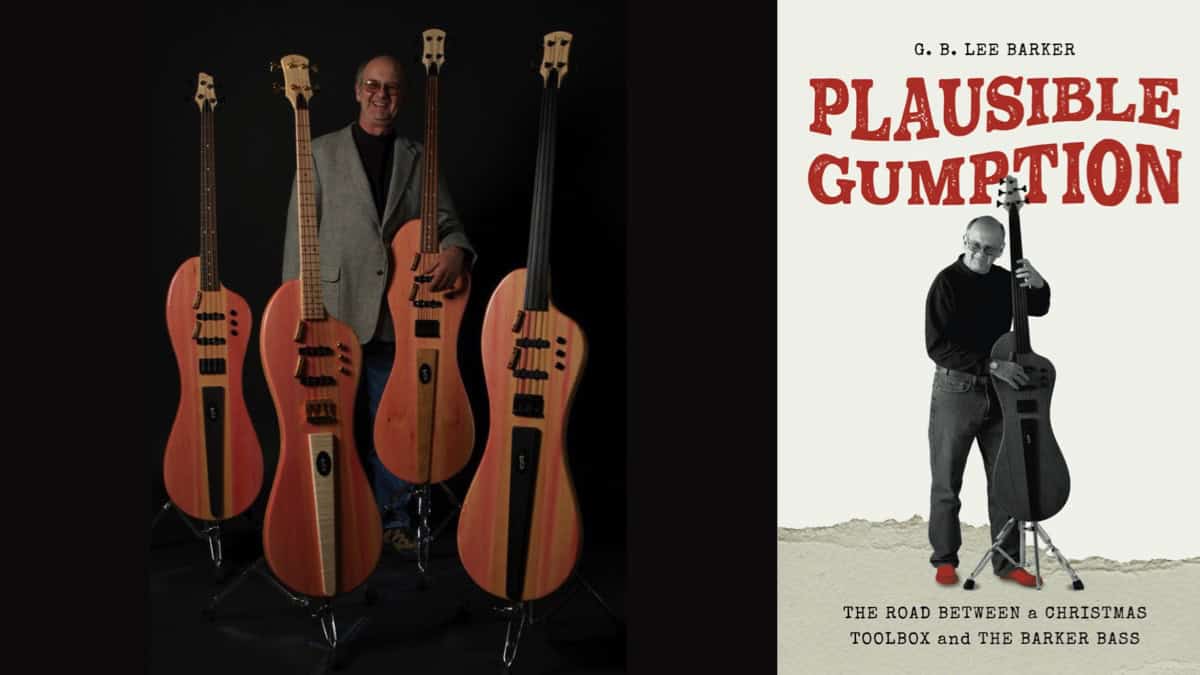
If you are an electric bass player, this is an exciting time to be alive as this relatively new instrument evolves around us. Some creative individuals have taken an active role in this evolution and made giant leaps in their own direction. Lee Barker is one of these inventive people having created the Barker Bass.
Fortunately, Lee is also an excellent writer (among so many talents) and has recently released his book “Plausible Gumption, The Road Between a Christmas Toolbox and The Barker Bass”. This book is a very fun read for everyone and shares a ton of details about Lee’s life in general, his experiences as a musician, a radio host, and a luthier. Now I am fortunate to have the great opportunity to gain even more insights into this renaissance man with this video interview.
Plausible Gumption, The Road Between a Christmas Toolbox and The Barker Bass is available online at Amazon.com
Features
Bergantino Welcomes Michael Byrnes to Their Family of Artists
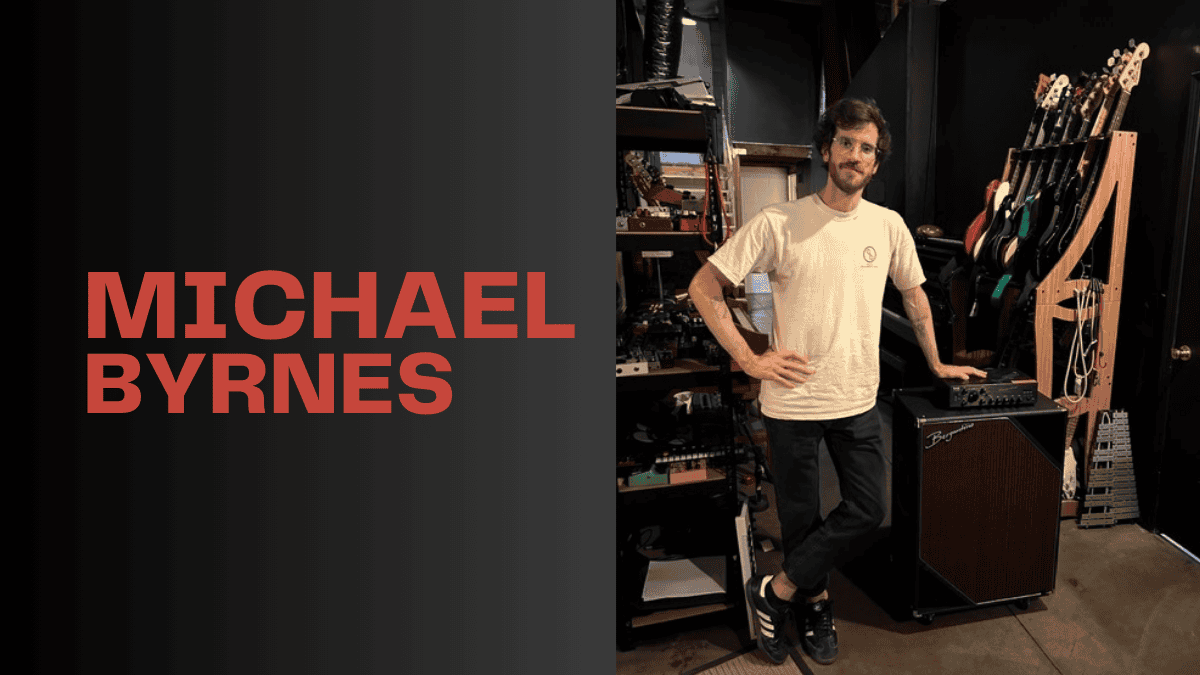
Interview and photo courtesy of Holly Bergantino of Bergantino Audio Systems
With an expansive live show and touring, Mt. Joy bassist Michael Byrnes shares his experiences with the joyful, high-energy band!
Michael Byrnes has kept quite a busy touring schedule for the past few years with his band, Mt. Joy. With a philosophy of trial and error, he’s developed quite the routines for touring, learning musical instruments, and finding the right sound. While on the road, we were fortunate to have him share his thoughts on his music, history, and path as a musician/composer.
Let’s start from the very beginning, like all good stories. What first drew
you to music as well as the bass?
My parents required my sister and I to play an instrument. I started on piano and really didn’t like it so when I wanted to quit my parents made me switch to another instrument and I chose drums. Then as I got older and started forming bands there were never any bass players. When I turned 17 I bought a bass and started getting lessons. I think with drums I loved music and I loved the idea of playing music but when I started playing bass I really got lost in it. I was completely hooked.
Can you tell us where you learned about music, singing, and composing?
A bit from teachers and school but honestly I learned the most from just going out and trying it. I still feel like most of the time I don’t know what I am doing but I do know that if I try things I will learn.
What other instruments do you play?
A bit of drums but that’s it. For composing I play a lot of things but I fake it till I make and what I can’t fake I will ask a friend!
I know you are also a composer for film and video. Can you share more
about this with us?
Pretty new to it at the moment. It is weirdly similar to the role of a bass player in the band. You are using music to emphasize and lift up the storyline. Which I feel I do with the bass in a band setting. Kind of putting my efforts into lifting the song and the other musicians on it.
Everybody loves talking about gear. How do you achieve your “fat” sound?
I just tinker till it’s fat lol. Right now solid-state amps have been helping me get there a little quicker than tube amps. That’s why I have been using the Bergantino Forté HP2 – Otherwise I have to say the cliche because it is true…. It’s in the hands.
Describe your playing style(s), tone, strengths and/or areas that you’d like
to explore on the bass.
I like to think of myself as a pretty catchy bass player. I need to ask my bandmates to confirm! But I think when improvising and writing bass parts I always am trying to sneak little earworms into the music. I want to explore 5-string more!
Who are your influences?
I can’t not mention James Jamerson. Where would any of us be if it wasn’t for him? A lesser-known bassist who had a huge effect on me is Ben Kenney. He is the second bassist in the band Incubus and his playing on the Crow Left the Murder album completely opened me up to the type of bass playing I aspire towards. When I first started playing I was really just listening to a lot of virtuosic bassists. I was loving that but I couldn’t see myself realistically playing like that. It wasn’t from a place of self-doubt I just deep down knew that wasn’t me. Ben has no problem shredding but I was struck by how much he would influence the song through smaller movements and reharmonizing underneath the band. His playing isn’t really in your face but from within the music, he could move mountains. That’s how I want to play.
What was the first bass you had? Do you still have it?
A MIM Fender Jazz and I do still have it. It’s in my studio as we speak. I rarely use it these days but I would never get rid of it.
(Every bass player’s favorite part of an interview and a read!) Tell us about
your favorite bass or basses. 🙂
I guess I would need to say that MIM Jazz bass even though I don’t play it much. I feel connected to that one. Otherwise, I have been playing lots of great amazing basses through the years. I have a Serek that I always have with me on the road (shout out Jake). Also have a 70’s Mustang that 8 times out of 10 times is what I use on recordings. Otherwise, I am always switching it up. I find that after a while the road I just cycle basses in and out. Even if I cycle out a P bass for another P bass.
What led you to Bergantino Audio Systems?
My friend and former roommate Edison is a monster bassist and he would gig with a cab of yours all the time years ago. Then when I was shopping for a solid state amp the Bergantino Forté HP2 kept popping up. Then I saw Justin Meldal Johnsen using it on tour with St. Vincent and I thought alright I’ll give it a try!
Can you share a little bit with us about your experience with the Bergantino
forte HP amplifier? I know you had this out on tour in 2023 and I am pretty
certain the forte HP has been to more countries than I have.
It has been great! I had been touring with a 70’s SVT which was great but from room to room, it was a little inconsistent. I really was picky with the type of power that we had on stage. After a while, I thought maybe it is time to just retire this to the studio. So I got that Forte because I had heard that it isn’t too far of a leap from a tube amp tone-wise. Plus I knew our crew would be much happier loading a small solid state amp over against the 60 lbs of SVT. It has sounded great and has really remained pretty much the same from night to night. Sometimes I catch myself hitting the bright switch depending on the room and occasionally I will use the drive on it.
You have recently added the new Berg NXT410-C speaker cabinet to your
arsenal. Thoughts so far?
It has sounded great in the studio. I haven’t gotten a chance to take it on the road with us but I am excited to put it through the paces!
You have been touring like a madman all over the world for the past few
years. Any touring advice for other musicians/bass players? And can I go to Dublin, Ireland with you all??
Exercise! That’s probably the number one thing I can say. Exercise is what keeps me sane on the road and helps me regulate the ups and downs of it. Please come to Dublin! I can put you on the guest list!
It’s a cool story on how the Mt. Joy band has grown so quickly! Tell us
more about Mt. Joy, how it started, where the name comes from, who the
members are and a little bit about this great group?
Our singer and guitarist knew each other in high school and have made music together off and on since. Once they both found themselves living in LA they decided to record a couple songs and put out a Craigslist ad looking for a bassist. At the time I had just moved to LA and was looking for anyone to play with. We linked up and we recorded what would become the first Mt. Joy songs in my house with my friend Caleb producing. Caleb has since produced our third album and is working on our fourth with us now. Once those songs came out we needed to form a full band to be able to do live shows. I knew our drummer from gigging around LA and a mutual friend of all of us recommended Jackie. From then on we’ve been on the road and in the studio. Even through Covid.
Describe the music style of Mt. Joy for me.
Folk Rock with Jam influences
What are your favorite songs to perform?
Always changing but right now it is ‘Let Loose’
What else do you love to do besides bass?
Exercise!
I always throw in a question about food. What is your favorite food?
I love a good chocolate croissant.
Follow Michael Byrnes:
Instagram: @mikeyblaster
Follow Mt. Joy Band:
Instagram: https://www.instagram.com/mtjoyband
Facebook: https://www.facebook.com/mtjoyband
Bass Videos
Artist Update With Mark Egan, Cross Currents
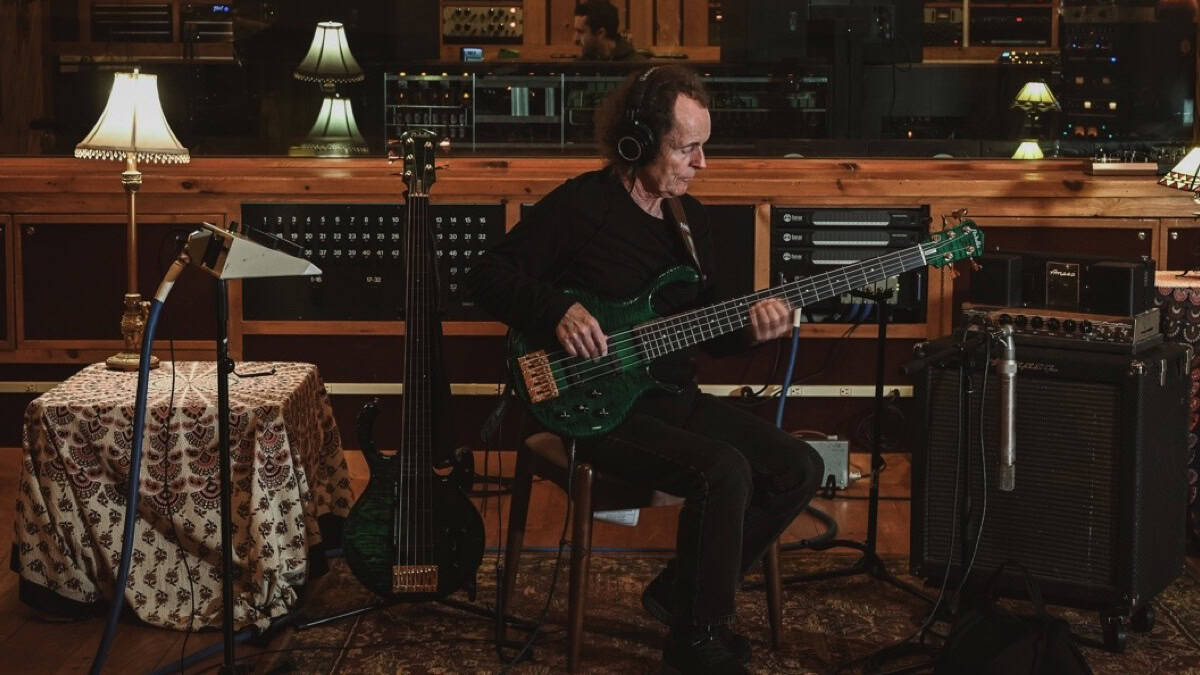
I am sure many of you are very familiar with Mark Egan as we have been following him and his music for many years now. The last time we chatted was in 2020.
Mark teamed up with drummer Shawn Pelton and guitarist Shane Theriot to produce a new album, “Cross Currents” released on March 8th, 2024. I have been listening to this album in its entirety and it is simply superb (See my review).
Now, I am excited to hear about this project from Mark himself and share this conversation with our bass community in Bass Musician Magazine.
Photo courtesy of Mark Egan
Visit Online:
markegan.com
markegan.bandcamp.com
Apple Music
Amazon Music
Bass Videos
Interview With By the Thousands Bassist Adam Sullivan
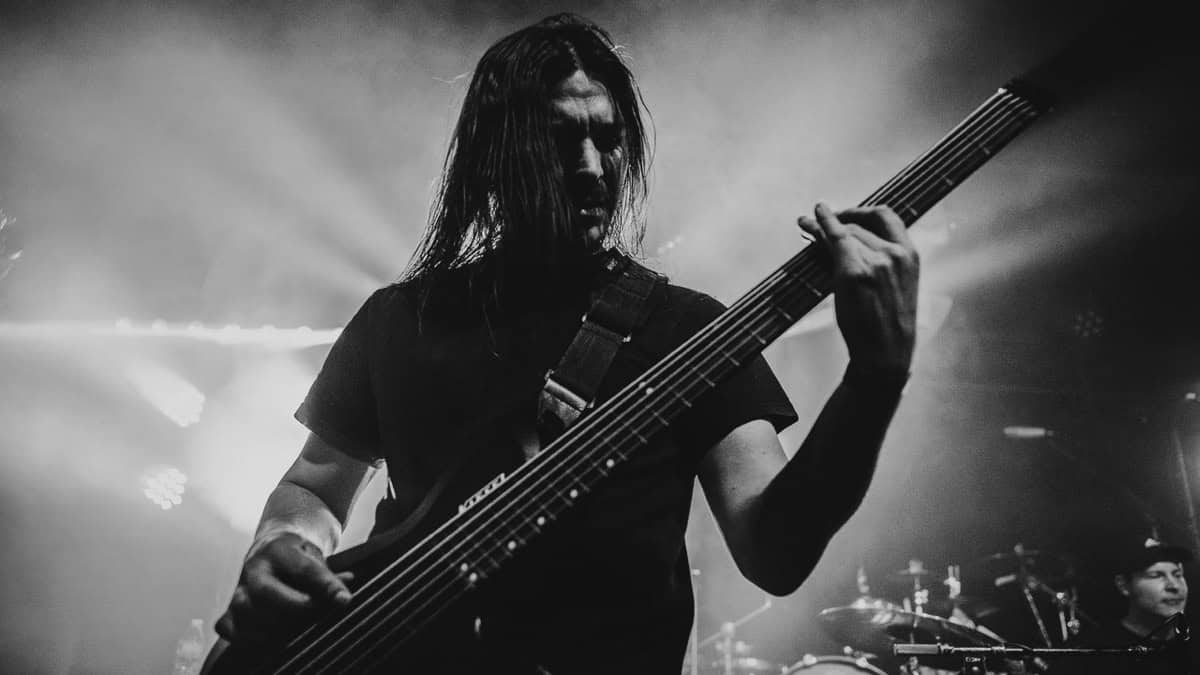
Bassist Adam Sullivan…
Hailing from Minnesota since 2012, By the Thousands has produced some serious Technical Metal/Deathcore music. Following their recent EP “The Decent”s release, I have the great opportunity to chat with bassist Adam Sullivan.
Join me as we hear about Adam’s musical Journey, his Influences, how he gets his sound, and the band’s plans for the future
Photo, Laura Baker
Featured Videos:
Follow On Social
IG &FB @bythethousands
YTB @BytheThousands












